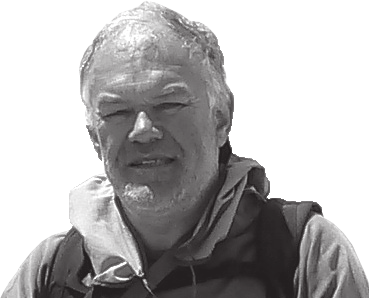Indigenous forest
A current website recently attracted my journalistic attention. Here I must point out that I only recommend websites these days where the creators identify themselves with their name and address. I no longer look at anonymous rubbish as a matter of principle. I do the same with telephone calls. I do not waste valuable time or my attention on people who call me from hidden numbers. As the creators of this website worked in a transparent way, I simply rang them up and asked them for an interview on the topic that had led them to put this website on the internet. We made an appointment for lunch in Porto. So, I bought myself a ticket for the 7.30 Alfa Pendular train from Tunes to Vila Nova de Gaia. The lunchtime interview took place in the restaurant in the Botanical Garden and lasted 120 minutes. In the afternoon, I then returned to the Algarve, where I arrived at about 8 p.m. My rail journey of around 1,200 km for this interview caused emissions of 15 kg of CO2, as the CP railway website calculator informed me, and it took just under 11 hours (there and back).
The website is called:
www.florestautoctone.webnode.pt
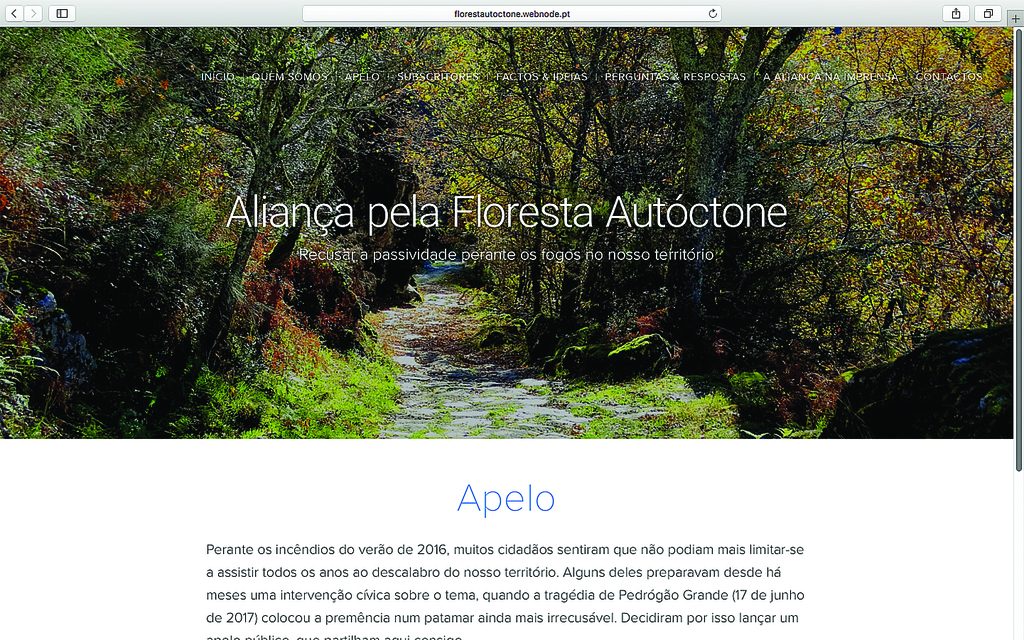
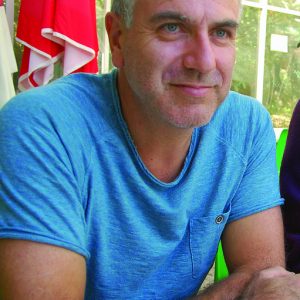
My name is Jorge Moreira. I’m an environmentalist and ecologist, trained in environmental sciences. I’m 52 years old. I own a company in which I do repairs of electrical and electronic equipment. I restore these pieces of equipment. I re-use a lot of material and that is a benefit from an environmental point of view, but it’s also how I earn my living. Most of the things I do in the environmental area are pro bono.
How many kilometres do you drive per year?
I do an average of 500 kilometres per week, because I go to collect a lot of material to repair in inland towns.
Do you compensate for this consumption in one way or another?
Compensate?
All of us leave a footprint.
Yes.
A Portuguese person emits, on average, seven tonnes per year.
During the week, from Monday to Thursday, I normally work at home, I don’t need to travel. Friday is the day when I do more kilometres. So, I compensate by trying not to work away from home, and not to leave any kind of carbon footprint on those days. And what has to be done, I do on Fridays.
I am asking because I know what my footprint is; it’s three tonnes per year.
I don’t know what my footprint is, tonnes, kilograms… No, I’ve never done that calculation.
500 km per week comes to five tonnes per year, if the vehicle is …
… diesel. But it has some filters, and all of those things. At the time I bought it, it was the most ecological alternative possible. Afterwards, it was discovered that it wasn’t quite like that, wasn’t it? But those are calculations that are beyond us.
And next we have…?
…Miguel Dantas da Gama. I’m an electro-technical engineer. I was, I’m not any more.
An engineer, like José Socrates?
No, no, no. I took the course at the University of Porto, but I don’t work as one any more. In 2009, I joined the conservationist movement. I was involved in the creation of Quercus, and then we set up FAPAS – Fund for the Protection of Wild Animals. Until then I exercised my profession, and from 2009 onwards, I turned my hobby into my job. So, I spend my time publishing books. I have a lot of work in the Gerês National Park.
Can you survive?
Since I stopped working, my life has changed a bit. I drive less; in Porto I just get around on foot. I have a scooter, which I use on the outskirts of the city, when I have to go out; and a bicycle which I use quite a lot. When I go up into the hills I take the jeep..
Are you happy?
I’m happy with the life I lead. In the world we’re in, I think of myself as privileged. I don’t feel very happy in this country because what I see is not very pleasant. There are problems that continue, and that get worse, and questions like the one that brings us here that make me worried. We have been saying for a long time that it would happen; normally no one listens to us. Things do not tend to change in the right direction. There are interesting initiatives by private individuals, but I see no major changes in the fundamental questions that have to do with a mobilisation of the state. Nowadays, people confuse use with conservation. The fact that people like being in natural surroundings does not mean that they are protecting them. Not much is being done for nature.
How old are you?
60.
Now the youngsters…
My name is Jerónimo Pinto Gama. I’m a soil ecologist. Some years ago, I was part of an environmental association called GAIA, which was a little like a hardline environmental association, more radical. But over time, I discovered that the biggest environmental issues we face need greater depth and more dedication. They need a certain commitment, seriousness. And so, I followed a line of more confrontation, which enables you to look at questions in a more intelligent way and have results in the long term.
Do you have a partner?
In my life? No. What’s that got to do with… (laughs)?
How old are you?
I’m 38 today. As a present, I’d like to see a rejuvenated and regenerated forest, I think that would be the best birthday present you could give me.
Happy?
Happy to some extent, to some extent incomplete.
Incomplete?
Yes.
But that is the theme of this edition: what are we going to do for what is missing?
And we also have José Marques, aged 74, aren’t you?
Yes, heading for 76, in May. I was born in Porto and I belong to a generation from before the 25th April (the 1974 revolution). The 1970s here in Porto were pretty tumultuous, but, on the other hand, interesting too.
It was in France, where I had been since 1970 as I did not take part in the war in Africa, that I found out about ecology. At that time in Portugal, there was almost no mention of it.
I took part in several initiatives over the decades. In 2000, a group of people from Porto founded the Associação Campo Aberto (Open Countryside Association). I have been connected with it since that time. And although attention was always paid to the land, to the rural world… the question of fires, of the forest, kept cropping up. I was always more focused on what we call rural renaissance, a movement for creating a new vitality in the rural interior of the country.
But against all expectations, what happened was exactly the opposite. Decade after decade, what was seen was complete abandonment and depopulation. And that started to be reflected in fires that were more and more violent, and more frequent.
Little by little, this subject began to grow in importance for me, but it was not until 2016 that it became a matter of urgency to make it more central.
What are your dominant feelings?
The dominant feeling is that I have little time ahead of me and I need to make the best possible use of it. I want to use this time to do something that could be useful to someone, even if it’s just one or two people. Do something to correct many of the terrible things that were done during that period.
Are you a teacher?
I was a teacher, but I had other professions. I also taught different subjects. I did the whole range of literature: languages, Portuguese, French, History. I was also a translator, an editorial assistant… editor of an encyclopaedia, including in Brazil in the 1970s.
Are you more affected by fear or by courage?
Fear and anxiety are feelings that are now so completely chewed over and over, shredded and internalised. I don’t know if I am afraid or not. It’s something that I’ve sublimated a bit… sublimated, and to some extent dominated, that that now, suddenly, I don’t know if I am or not. But obviously in a concrete situation I am afraid.
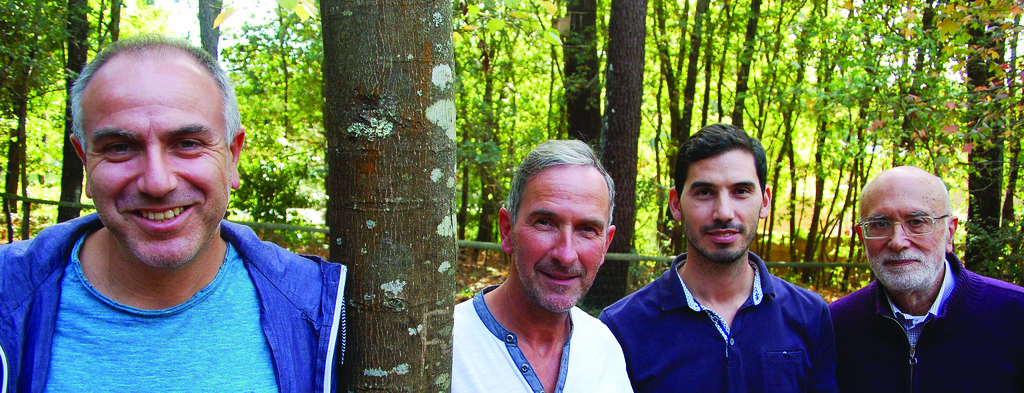
Jorge Moreira (1967), Miguel Dantas da Gama (1958), Jerónimo Pinto Gama (1981) e José Carlos Marques (1945)
Why did the four of you come together in this project: www.florestautoctone.webnode.pt? How did you have this idea?
Jorge Moreira: A movement started last year in the social media, following a photo I published. It consisted of a homage to the trees that had disappeared in last year’s fire. Half a dozen people came together there with the same feeling and the same desire to change the paradigm of forest fires.
José Carlos found out that this movement existed and called a meeting as the coordinator to discuss both the question of fires and that of plant cover. At a later meeting, the idea arose of doing something, which culminated in the appeal for an indigenous forest.
I see the forest in a different way. The forest has its rights, the rights of nature. The forest must not be used in an authoritarian or anthropocentric way, with everything solely and exclusively being done in the interest of humans. There is an area that is very dear to me, which is environmental ethics, the relationship that we all have with nature and other forms of life.
And this rethinking of nature, and our relationship with it, goes to the very heart of the question: why is the forest the way it is? Why are we destroying vast areas of almost completely, indigenous forest, harming it with monocultures of eucalyptus or maritime pine? Why? That’s the problem! Our indifference, our mistaken way of looking at nature as something that is not alive. Nature is alive! And the forest is part of nature. It’s our basis. It’s where most of the fauna lives, which is also highly valued, and which also has the same right to live in a healthy way, like us.
The president of Portucel and Navigator may have a different idea, don’t you think?
I know they have. Their idea is just to look at the forest as a source of profit.
And a way of creating jobs.
Yes, but it doesn’t really create any. Because if we plant a eucalyptus monoculture at a particular site,, it grows by itself, and all we need to do then is pray that it doesn’t catch fire for a decade, and in the end we go and collect the profit.
An indigenous forest isn’t like that: normally you have to be there on the ground to care for it, at least in the early stages. And later it becomes self-sufficient, but in the early stages it needs to be cared for. Afterwards, we can provide a wide range of services, apart from managing the ecosystem, the basis of our well-being, of our life.
We want fewer losses.
Obviously. And the fires would be less severe. The severity and the vengefulness of the fires in an adult indigenous forest would be completely different from that in a monoculture of eucalyptus or maritime pine. There are plenty of studies that prove exactly this: the severity is much greater with this type of widespread flammable matter, such as eucalyptus and maritime pine, than for example with oak, cork oaks, and birch trees…
Besides all this, there is the beauty. And this, for me, is not just a consideration relating to tourism, although we can make use of this aspect to publicise Portugal. But it is necessary to look at nature and see something that binds us together profoundly.
And we need shade.
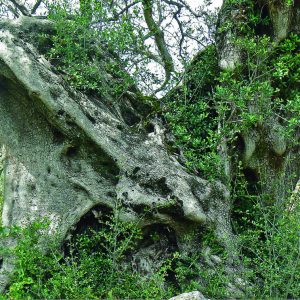
José Carlos Marques: Exactly. At the start of this initiative, the Alliance for the Indigenous Forest was linked to the summer of 2016, with both a scale and a number of deaths that were much higher than those recorded in the previous years, except in 2003 and 2005. So the idea came back into being because of the scale of the fires in 2003 and 2005.
At that time, the partnership between a community in Porto and the Associação Campo Aberto, where I work, was revived at the suggestion of one of the people, who was originally from Passos de Sousa, where many fires were occurring at that time. The talk was of a long-term project… 200 years.
And it was this expression that she used that sparked my interest. Because it’s true that we were constantly seeing action and reflection about what was happening in our forest, in our plant cover, but always on a very short time scale and never seeing the issues in perspective.
For this reason, I proposed that we should organise a meeting in partnership, which was entitled: an alliance to put an end to fires for good. I then invited three people, who are present here. I knew them already, thanks to my activities and interests… and Miguel, Jerónimo and Jorge then gave the introduction to the debate, which was held on 29th October.
All the fires had already happened, above all in August, but they had continued. At this meeting, with close on 30 people present, everyone was called on to make a brief presentation about how they thought forest fires could be ended once and for all, and this included putting an end to the sheer scale that the fires had reached.
Things then developed and we hit on a somewhat different name: an alliance for the indigenous forest. We drew up a series of principles or starting points; they are on a website that was created in September.
We are all incomplete. Some more so, some less so. We need to invest in educating people, to understand that our planet is a sensitive biotope. How are we going to transform theory into practice?
Jerónimo Pinto Gama: The Alliance is, in fact, an initiative in which the most important thing is the reflection that precedes action, and which is nothing less than a project for reforestation.
Is there a lack of environmental education in schools, or not?
José Carlos Marques: I have kept abreast of issues connected with the environment to some extent. I don’t have a very strong view on this subject. There is no doubt that education is the basis, education is fundamental. There are so many ways of conceiving it and of putting it into practice, that, without going into more detail, you end up sounding banal.
Education with children, especially with the youngest ones, is very important, without doubt, but certain illusions sometimes exist about its effectiveness. It’s important not to forget that a child becomes an adolescent and the adolescent becomes an adult; and so there is an adolescent culture and an adult culture. And often the culture of childhood disappears, suffocated by the adolescent culture and the adult culture. It sometimes happens.
What do we need to learn?
Miguel Dantas da Gama: There is a great deal we need to learn. We are involved in a complicated problem. The question of the forests and the fires is just a consequence. We have a much deeper problem – the plant cover – and linked to this is a series of other problems that we have been making worse for decades: land use planning, knowledge. We are involved in several vicious circles that it is difficult to get out of. We have a society that criticises, for example, the American President because he doesn’t recognise, or accept, that there are serious climatic problems. But then we do the same. We don’t recognise them or accept them either. We don’t change. And that is also a reality in the rural world. Just yesterday, the television was showing people having fires at night. People have no idea that things are changing. Showing that people either run away or stay at home at the moment of a fire only demonstrates that they don’t know how to deal with the environment. And they are not keeping abreast of changes. At the moment we have an accumulation of errors that are to do with the destruction of the plant cover of the forest. They are to do with the abandonment of the rural world. We change the cover and then we abandon the land. Maybe one thing is closely connected with the other. The problem now is that the land we have abandoned is land that has been profoundly changed by humans and it cannot survive on its own. So we have to rehabilitate it so that people can return there, possibly. An area like we have at the moment – large areas of monoculture – doesn’t encourage people to settle there, and these are the same people who left the land because they destroyed it first. And this is a vicious circle that will never end.
What needs to be done?
Miguel Dantas da Gama: Private initiatives are important. But, given the depth and the size of the problem, the State has a key role to play. And the State is a problem. At the moment it is a problem because the State’s policy and the idea it has for the future is to wash its hands of having responsibility for solving problems. So, it is only by compelling the State to return to the area and to implement the profound change that is needed – with the commitment of everyone, be it the central government or the local authorities or the rural communities that need to be re-established – that we will be able to make major changes.
What is the first step?
Miguel Dantas da Gama: I recognise the value of one-off local initiatives, where there is sometimes a group, or a campaign that comes to people’s attention and is replicated and which, suddenly, gains a certain size. But it’s difficult to make this leap. Society needs to be mobilised. Society needs to have the idea that we are living with a serious problem that demands major changes, and that these will take decades to bring about. We will have to spend quite a long time having to invest before we see any return. We have to restore a forest that we have destroyed over centuries. This period of time needs a lot of help and a lot of commitment. It is only with the support of the State, with its presence on the ground, with the restoration of some structures that existed in the past and which were not correctly used, but which were good structures for working, with the establishment on the ground of forest nurseries and forest guards, giving priority to the owners who have invested there in the long term, that we will be able to enjoy a wholesale recovery of the land.
Now, there is a great deal of damage that cannot be put right. There is the question of land use planning, because a whole series of terrible things were permitted: houses in the middle of nowhere, factories mixed with residential properties (here in the North and the Centre, the situation is much more complicated than in the South). And the problem is that people who have the power to intervene, who have a voice in the media, and who control it, are the same people who have been responsible for this situation for decades.
Today, local authorities are complaining about the fires and the lack of resources to fight them, but it was the local authorities themselves, in the fiirst place, that allowed the land to become deregulated – against the advice of ecologists, who were always labelled radicals and extremists. There was building where there shouldn’t have been, the areas of monoculture were enlarged. They themselves created the problem. And nowadays, the discussion continues to be about civil defence, about the firefighters and all these infrastructures. Everyone is working against each other because there are many cliques that act to further their own interests and don’t go to the root of the question – restoring what is needed for there to be no fires. Maybe we could have fewer deaths, fewer – if we had a more dynamic civil protection service, one that is more effective and better controlled… But the fires won’t put an end to this type of forest or this type of exploitation.
And when calculating the debit side and the credit side – because these days there is much talk of monoculture afforestation which generates a return, because it creates a lot of debt and people only see the exports – the damage and losses are not taken into account. And the damage is borne by all of us. It’s not borne by the companies that run the monocultures and now go and get burned wood for next to nothing. So, this does not appear on the balance sheet: everything that is spent. And I’m not even talking about the loss of so many lives.
Let’s talk about solutions. What is most important?
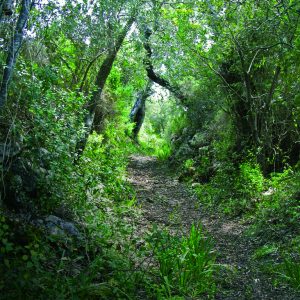 Miguel Dantas da Gama: Não vivemos num mundo imaginário. Nós não somos idealistas ao ponto de dizer que queremos uma floresta bonita que garanta a biodiversidade. Não. Queremos uma floresta que acabe por ser rentável, vai levar é tempo. Mas uma floresta que permita às pessoas retornar ao interior do território, viver com essa floresta. E que permita uma quantidade de produtos, desde a madeira aos frutos secos, passando pelo mel e pelas indústrias transformadoras de madeira. Que permita também o regresso de muitas atividades e profissões que se perderam com a perda da floresta. Importamos madeira para mobiliário do Brasil e de outros países.
Miguel Dantas da Gama: Não vivemos num mundo imaginário. Nós não somos idealistas ao ponto de dizer que queremos uma floresta bonita que garanta a biodiversidade. Não. Queremos uma floresta que acabe por ser rentável, vai levar é tempo. Mas uma floresta que permita às pessoas retornar ao interior do território, viver com essa floresta. E que permita uma quantidade de produtos, desde a madeira aos frutos secos, passando pelo mel e pelas indústrias transformadoras de madeira. Que permita também o regresso de muitas atividades e profissões que se perderam com a perda da floresta. Importamos madeira para mobiliário do Brasil e de outros países.
Portugal não tem petróleo, mas poderia ter um manancial – o nosso petróleo poderia ser uma floresta sustentada. Estamos a ter um boom turístico neste momento também derivado aos problemas que se vivem noutros países. Mas quem é que vem fazer turismo para um país onde morrem cem pessoas em dois ou três dias? Eu tenho dificuldade em arranjar mais dois ou três acidentes em Portugal no meu tempo de vida em que tenha morrido tanta gente! Houve um desastre de avião na Madeira e mais um ou dois desastres, um de comboio. Mas morreram cem pessoas! Cá fora, na rua. Apareceram mortas na rua.
Agora têm de se desmontar um certo número de discursos que são contraditórios. Porque muitas das pessoas que se queixam são vítimas da sua própria, eventualmente, ignorância. Mas foram levados a isso também.
Miguel Dantas da Gama: We do not live in an imaginary world. We are not idealists to the point of saying that we want a beautiful forest that guarantees biodiversity. No. We want a forest that ends up being profitable. It will take time. But we also want a forest that enables people to return to the interior of the country, to live with this forest. And which permits a number of products to be made, ranging from wood and dried fruits to honey and the wood processing industries. Which would also permit the return of many activities and professions that were lost when the forest was burnt. We import wood for furniture from Brazil and other countries.
Portugal has no oil, but it could have a source of wealth – our oil could be a sustainable forest. We are also having a boom in tourism because of the problems that other countries are facing. But who is going to be a tourist in a country where 100 people die in two or three days? I have difficulty thinking of more than two or three accidents in Portugal during my lifetime in which so many people died! There was a plane crash in Madeira, and another one or two disasters, one with a train. But 100 people died! Out here, in the street. There were dead people in the street.
Now it’s important to do away with a number of ideas people have that are contradictory. Because many of the people who complain are possibly victims of their own ignorance. But they were made like that too.
How are we going to reduce ignorance? Are we going to start with schools?
Miguel Dantas da Gama: Yes, yes. But there have to be some restrictions on the media. The media needs to change too. It exploits the emotions of people who are suffering. And it should put on its agenda all the action that needs to be taken to prevent fires happening. Instead, the media will argue and talk about people so that it can exploit their bitterness and their suffering. And they don’t go to the heart of the matter. They listen to the firefighters criticising the government.
And what do you aim to do with the association?
Miguel Dantas da Gama: Join together. At the moment we are taking the pulse of the nation and seeing how society would view it, finding out what the public opinion is, finding out if there are a lot of people who share our ideas.
How many subscriptions have you received?
José Carlos Marques: Seven hundred and forty subscriptions in one month. But this is not a normal petition where you try to obtain thousands of names and then it’s handed in to some authority or other. It is a kind of permanent demonstration by hundreds of citizens, who we hope will continue to increase in number, who are aware and are looking for a certain unity, a certain union at a local level, at the municipal level for example, to work together with an attitude of vigilance, and monitoring what is going on in their own area, in their own municipality. Encouraging planting.
Jorge Moreira: We are encouraging people to get together and go to places out in the field, to the local authorities… But the local authorities can also find solutions to transform, say, what is bad in the forest, and replant especially native trees, which are much more resistant to fire and, as Miguel said, keep people in the inland areas.
José Carlos Marques: That is exactly the task: to stimulate cooperation and bring together things that are separate and could converge. We are trying to create a voice and trying to ensure that this voice is heard. And that will be the first phase.
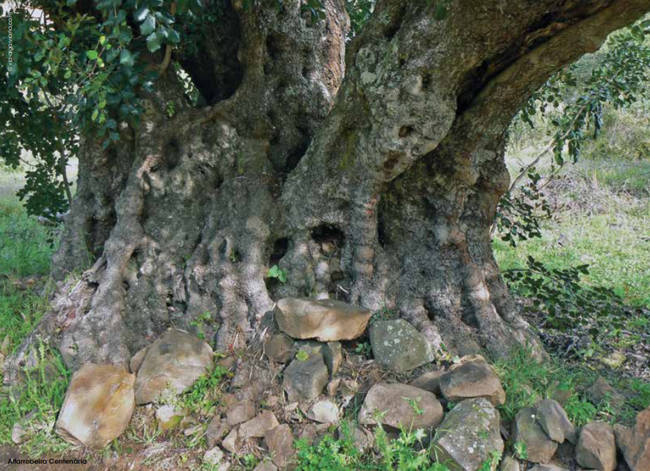 Miguel Dantas da Gama: There is a question that was raised just now and which, for me, underlies everything, which is the question of education. José Carlos said, quite rightly, that sometimes a lot is lost between childhood and all the rest. Education for me is fundamental, but it has to be continuous, from childhood to adulthood. We have to create schools that are in contact with reality. And we have to create a culture that is in contact with the reality of life. It’s not education for competition, so to speak. We have to create an education for cooperation. And we have to look at nature not as something dead, something inert, that only has economic value. Instead we have to look at it with respect, with care, with love, with the capacity of seeing that it really is our mother. It’s nature that provides for us, and it’s important to teach that in schools. It will certainly change the whole paradigm of how we see nature. We will create a completely different society.
Miguel Dantas da Gama: There is a question that was raised just now and which, for me, underlies everything, which is the question of education. José Carlos said, quite rightly, that sometimes a lot is lost between childhood and all the rest. Education for me is fundamental, but it has to be continuous, from childhood to adulthood. We have to create schools that are in contact with reality. And we have to create a culture that is in contact with the reality of life. It’s not education for competition, so to speak. We have to create an education for cooperation. And we have to look at nature not as something dead, something inert, that only has economic value. Instead we have to look at it with respect, with care, with love, with the capacity of seeing that it really is our mother. It’s nature that provides for us, and it’s important to teach that in schools. It will certainly change the whole paradigm of how we see nature. We will create a completely different society.
Instead of being a predatory society, which destroys, which consumes, which exploits, we will create an inclusive society that creates benefits, that creates goods, but that also cares. And for me this underlies everything: it needs to be worked on from childhood, and that is to do with us, with relationships.
How do we do that?
Miguel Dantas da Gama: We have to rethink our way of being and living here.
Jerónimo Pinto Gama: Our priority is to change the paradigm of the forest. So, the focus cannot be on reforestation initiatives. The focus has to be on deep and organised forestry planning. There must be forestry plans that make sense at the local and regional level, and later at the national level.
Personally, I do not really agree with the reform or the National Forestry Plan. There are regional forestry plans. Because the forests in the north are different from those in the south, the problems caused by the conditions vary from region to region. And east-west, it is the same thing. We do not have concrete measures that have been developed and are properly explained for this paradigm shift to occur.
However, the measures for an indigenous forest and for this change to happen are being developed and necessarily involve four or five plans: a judicial-legal plan; a legislative plan; the actual forestry plan, for the application of measures on the ground, a civic plan… and, during this interview, another plan occurred to me, at the business level. Companies also have a social responsibility which they should be required to fulfil.
Thank you.
 Eco123 Revista da Economia e Ecologia
Eco123 Revista da Economia e Ecologia

